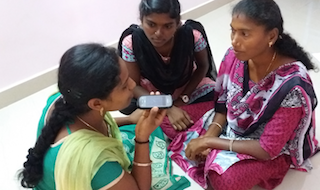“India lives in its villages,” said one leader on Urimai Kural (“voice of rights”), broadcasting from Chennai on May 1, 2018. “But the villages are losing their grace. Whose fault is this? The government’s? Politicians’? No! It is we who are responsible… Your city may give you your daily needs, but this holiday, go to your village and attend the Gram Sabha.… Don’t let your government impose things you don’t want and need. You know what is needed for your village.”
Two women-led unions in Tamil Nadu are using Gram Vaani’s IVR platforms to push for greater participation and accountability of Gram Sabha meetings, where citizens discuss their problems and needs and decide on ways to use available resources. The state government has failed to hold Panchayat elections that were due in 2016, making the stakes for citizen participation in these meetings even higher.
Leading up to May 1, union leaders of Penn Thozhilalargal Sangam (PTS) from Chennai and Tamilnadu Textile and Common Labour Union (TTCU) from Dindigul pushed their members to attend Gram Sabha meetings in their villages, to report on what took place and measure up delivery and change from one meeting to the next.
In the days following the meetings, Gram Vaani’s two platforms received over 65 responses, with women using their mobile phones to record what had taken place in Gram Sabha meetings in their village and their views on it. With no elected officials, such meetings are ruled by bureaucrats.
Top-down agendas, little discussion
From TTCU Kural, one contributor commented dryly that in spite of appropriating Labour Day for the Gram Sabha meetings, there was no mention of labour.
Several women complained that there was little discussion nor review of progress. “I asked them to share the decisions that were taken on January 26 [the previous session] so that we can see what work has happened on these since, but they didn’t do so; they went on to announce new decisions,” said one caller who represents her community in various development initiatives. “Whatever was discussed last time was again discussed,” said another commentator.
Some callers indicated a lack of engagement from villagers and presiding officials alike. “There were too few people at the outset and we were worried because at least 100 people are required to conduct the meeting,” said one caller. “Then the officials forced people to come”.
Another said, “Some 150 of us participated. When the leader of the village youth association explained beautifully the role of the Gram Sabha and the responsibilities of citizens in ensuring that it is fruitful, the Block Development Officer (BDO) showed no appreciation.”
In several reports, it was clear what was top of mind for the officials. “The BDO asked how many houses had toilets, telling us that the balance should be completed by the next meeting. Some people raised the issue that the toilets constructed are of bad quality. She replied that the government money is just to help them and that they need to add their own funds to build a strong toilet. Then she explained the ill effects of open defecation.”
“We resolved the issue by ourselves”
In Chennai, topics of discussion included water scarcity, the MGNREGA scheme (which guarantees 100 days of employment a year) and the need to expedite distribution of land ownership records that give the occupant rights over their land. But it was clear that some topics were not up for discussion.
“Twenty of us women participated from the village. When we brought up the issue of shutting down the liquor shop, they refused to discuss it,” said a contributor from Chennai.
Another caller, who raised the issue of a leaking water tank in the village, said, “At the meeting, the clerk told us that until they receive funds they can do nothing to repair the water tank. We returned home and decided to collect 20 rupees from each house to get it repaired ourselves. Now we get water all day.”
All the same, callers on Urimai Kural and TTCU Kural did get an opportunity to share grievances, ranging from crumbling anganwadi buildings to non-functioning street lights to lack of garbage disposal spots and drainage facilities. These callers mentioned that the officials responded saying they will take the necessary action.
Looking ahead
“We are campaigning that elections must take place,” said Sujata Mody, President of Urimai Kural’s Pen Thozhilalar Sangam (PTS) union in Chennai. “But that doesn’t mean we don’t try to make the best of these meetings”.
Today, August 15, Tamil Nadu goes in for its next round of Gram Sabhas. Gram Vaani’s IVR platforms and their partner unions have been pushing participation and accountability. Watch this space for updates!



